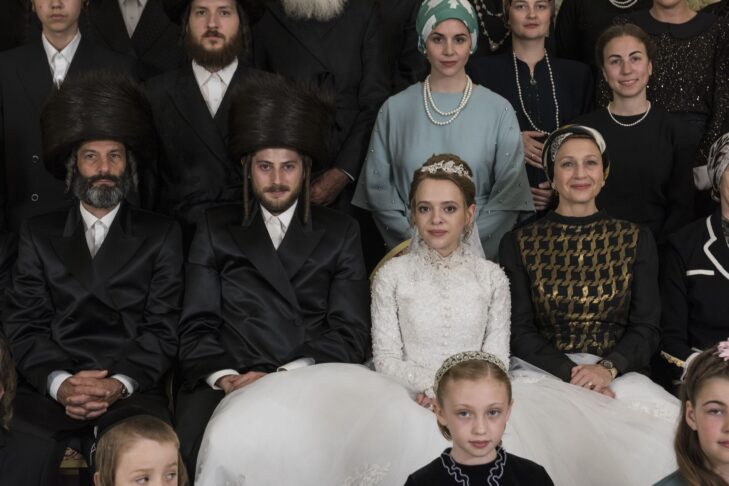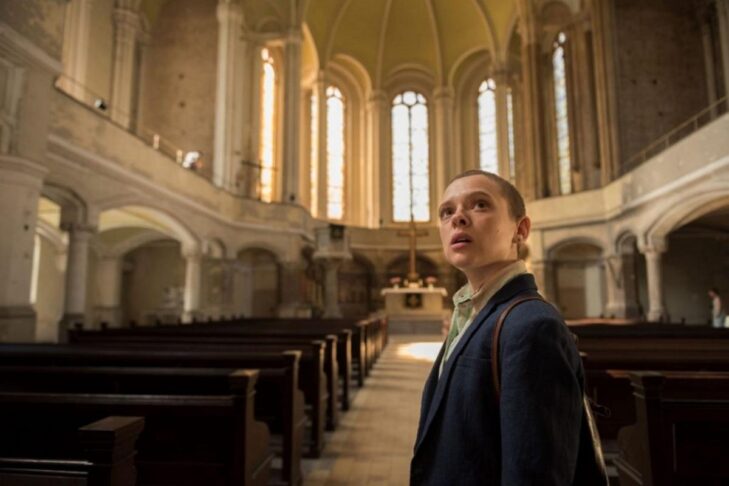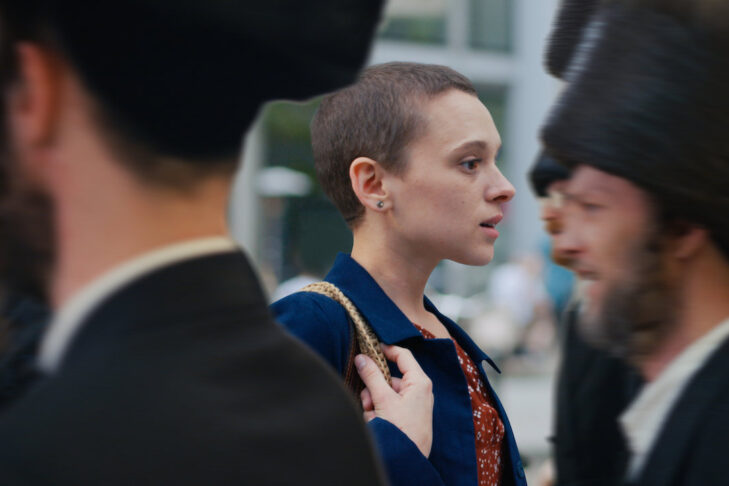In the opening scene of “Unorthodox,” Netflix’s new limited series, the community eruv has been torn from its pole. The eruv is a simple cable that delineates boundaries in which traditional Jews can move items to and from places in designated areas and parents can push children in strollers.
This particular eruv dangles in the air, effectively stranding the group of young mothers who have gathered in 19-year-old Esther Shapiro’s Williamsburg apartment building in Brooklyn. Shira Haas, the Israeli actress known to Netflix audiences from “Shtisel,” plays the anxious Esther, or Esty as she known in her family, to perfection.
Esty belongs to the Satmar Hasidic sect, a group of ultra-Orthodox Jews who were practically wiped out during the Holocaust. They reestablished their community in Brooklyn to repopulate their numbers and continue their brand of Judaism. In the beginning moments of “Unorthodox,” Esty flees her Hasidic community, no longer adhering to the restraints of her marriage, or the eruv.
“Unorthodox” is based on Deborah Feldman’s memoir of the same name. The series adeptly captures the spirit of Feldman’s story. However, unlike Feldman, Esty immediately escapes to Berlin and falls in with a group of musicians. Feldman’s actual break from the Satmar was more gradual. She was married at 17 to a boy she had seen only twice previously. In her book, Feldman is baffled by her body’s rejection of sexual relations with her husband. Haas’s performance as Esty, a newlywed, is extraordinary. She’s wide-eyed with fear and grief over her inability to consummate her marriage for a year.
Related
Feldman initially tasted freedom as a student at Sarah Lawrence College in suburban New York. She told her husband she was studying business, but enrolled in literature classes. On campus, she temporarily traded her wig and long skirt for a pair of jeans. In Berlin, Esty undergoes a quicker, more drastic rebirth. Early in her adventure, she goes on an outing with her new friends to Lake Wannsee. The lake is the site of the Wannsee House, where the Final Solution was crafted.
The scene brilliantly brings together so many of the themes running through “Unorthodox.” In this particular instance, water is as cleansing as it is liberating. Esty walks into the lake, where she casts off her wig to float unencumbered in the water. In an earlier scene in the mikveh, the traditional bath in which Hasidic women and Jewish women, in general, immerse before marriage, Esty is both terrified and excited about her wedding night. The bath water rushes over her, engulfing her.
Esty’s worldly education in Berlin continues as she watches people openly kissing in public, goes clubbing and chooses to wear secular clothing. Her years of piano lessons come to fruition when she applies to study at the same music conservatory where her friends are.
The vulnerable, naïve Yanky is distraught when Esty leaves him. At his overbearing parents’ urging, he goes to Berlin to find his wife with his gun-toting cousin Moishe. Moishe had left the Williamsburg community and returned only to find he remains an outsider. As he and Moishe search for Esty in Berlin, the city’s complexities for Jews are transparent.
Complicating the hunt for Esty is yet another thread in the show. Esty is pregnant—something Yanky discovers while combing through her cell phone messages. Motherhood is front and center for Esty after she confirms her pregnancy. She emphatically tells her doctor she will never have an abortion. Her decision, however, is overshadowed by Leah’s leave-taking early in Esty’s life. Esty has no idea that Leah’s in-laws forbade her to see Esty. What Esty does know is that, like Leah, there is no turning back. She must continue on her journey not only for herself but also for her child’s well-being.
“Unorthodox” is an adept, multilayered story, and the character of Esty beautifully anchors the show. Haas’s performance has deservedly earned her rave reviews. And while I admire the show for depicting a profound and universal coming-of-age story, it would have been a less-hectic presentation if the show’s story arcs had more time to develop. Nevertheless, “Unorthodox” is compelling and true to the form of Judaism and the people it portrays.
https://www.youtube.com/watch?v=-zVhRId0BTw








